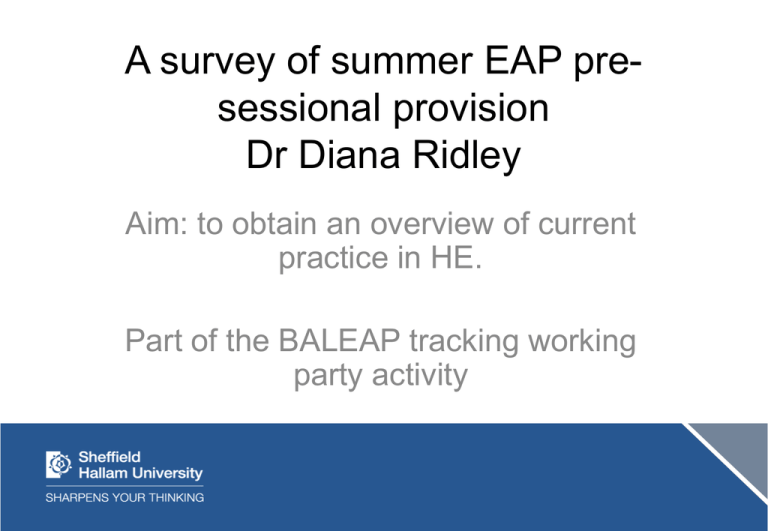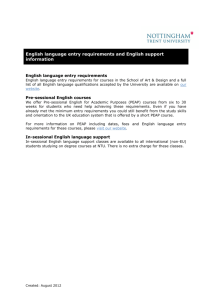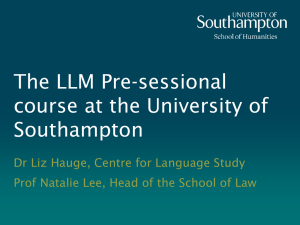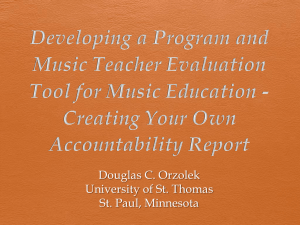A survey of summer EAP pre-sessional provision
advertisement

A survey of summer EAP presessional provision Dr Diana Ridley Aim: to obtain an overview of current practice in HE. Part of the BALEAP tracking working party activity Themes to be explored • • • • • • • • • • the department which offers pre-sessionals length of summer pre-sessional courses numbers and types of students perceptions of pre-sessional provision types of pre-sessional (generic /specific) entry requirements destinations after the pre-sessional pre-sessional assessment tracking pre-sessional students other issues for EAP and pre-sessionals Who responded? • • • • Online survey using Survey Monkey Link sent to BALEAP 85 institutional members 44 usable responses 39 institutions do offer summer pre-sessional courses • 5 respondents say they do not, one saying that the provision is outsourced. Academic department or central department Name of the department offering EAP pre-sessional courses 20 11 2 2 'English language' 'languages' 'international' 'EAP' or 'academic literacies' (others didn't respond or put down an individual's name) Majority refer to English language or languages and not to EAP or academic literacies. Pre-sessional course lengths Blocks of between 4 and 10 weeks are the most common. length of pre-sessional course number of institutions that offer this length of course 2 weeks 1 4 weeks 14 5 weeks 11 6 weeks 9 8 weeks 11 10 weeks 13 11 weeks 2 12 weeks 8 14 weeks 1 15 weeks 3 18 weeks 1 20 weeks 3 Some numbers • Number of students attending: – range 12 to 800 – average 264 – most common 200 • Percentage of students with conditional offers – range 100% - 15% – average 81% – most common 90% • Postgraduate or undergraduate - majority of courses are for both UG and PG, but majority of students are PG • • • • 6 institutions offer courses only for UGs; 12 only for PGs; 34 for both One university has components of the course specifically for either for UGs and PGs. Another separates the 4 week block into PG, PGR and UG. One respondent commented that number of UGs is increasing and this is changing class dynamics Pre-sessional students do better 'It is almost universally reported by the University's departments that students from the summer programme are better equipped to cope with the student experience than those coming straight onto a degree programme with no pre-sessional training. An IELTS 6.5 alone does not inspire a great deal of confidence.' Links with future support (The pre-sessional course) 'functions as an effective needs analysis mechanism for further skills development'. Feedback from students 'The main feedback from students is that they feel very much better prepared for their courses in October than even the home students - they know their way round the university, they have written two academic papers, have given videoed presentations, have had to use the university's eresources, have got to know their departments, and have also been introduced to the cultural and social side of the university through the social programme which is run by a current graduate at the university.' Relationship with receiving departments both positive and negative 'Departments are generally very supportive and many provide a pre-sessional lecture'. (It is a problem) 'getting sufficient involvement …' 'Departments don't engage with us much as a rule. No discipline-specific engagement from departments during pre-sessionals'. Generic/discipline specific • More generic than discipline specific presessional courses are offered • 35 institutions offer generic courses • 26 institutions offer discipline specific courses • 16 insitutions offer only generic provision Examples of variation: • afternoon teaching is discipline specific • Final four weeks of the summer provision is discipline specific. Discipline specific summer pre-sessionals Discipline Number of institutions offering each one Business and management 14 Law 8 Science and Engineering 7 Art and design/creative arts 6 Economics and finance 5 Computing 4 Linguistics 4 Social Science and humanities 3 Politics and international relations 2 Medicine 2 Biomedical science 2 Development, media, culture, music, fashion management, product design, construction, sport science, human nutrition 1 institution offers each of these Challenges of discipline specific provision 'Difficult providing appropriate discipline specific materials to meet everyone's needs'. 'Discipline specific pathways … are a challenge because of the wide range of programmes to prepare'. 'Discipline specific works better for some groups than for others, e.g. accounting and finance quite a coherent group vs engineering and sciences - rather mixed subjects here; small numbers … can mean small classes for one group; tutors teaching across disciplines (usually two tutors to a class and they stay with same subject)'. Entry requirements: a wide array of different possibilities • an overall IELTS band requirement or equivalent • may specify a minimum band in writing (and possibly reading), either the same as overall band required or half a band below • a different IELTS band requirement for different lengths of pre-sessional course • a IELTS band requirement related to degree programme entry requirements (e.g. one band below for a 10 week course) • a different IELTS band requirement for different subject areas; sci and eng may be half a band below. • a different IELTS band requirement for UG or PG; UGs may be half a band below The range of pre-sessional entry requirements (IELTS band or equivalent) 4 week presessionals or shorter 5-7 week presessionals 8-10 week presessionals 11-18 week presessionals no more than 0.5 band below degree no more than one band below the degree programme entry req. or same IELTS req. programme entry req. (occasional exceptions) as degree offer or only accept students with unconditional offer majority ask for bands 6.5 / 7; sciences - band 6 range of bands 5.5 6.5; majority ask for bands 6 / 6.5; science and engineering - band 5.5 a range of bands 5 - a range of bands 5 6.5; majority ask for 6; majority ask for bands 5.5 / 6; band 5.5. journalism - band 6.5; social sciences, health, MBA - band 6; sciences - band 5.5 Degree programme destinations Number of students who stay at the same university for their degree programme: • Average: 93% • Range: 100% - 70% • Most common: 90% It is often unknown exactly how many students go to another university or do not go onto a degree programme. Pre-sessional assessment - a wide variety of combinations of the following Type of assessment Number of institutions that use this Internally assessed project 30 continuous assessment (e.g. a portfolio) 27 internal end of course exam 30 external exam (e.g. IELTS) 2 automatic progression (assessment is formative; attendance on the presessional is the only requirement) 2 Assessment continued (two examples) Example 1: – – – – group presentation - 30% extended essay - 30% summative tests - 30% independent learning portfolio - 10% Example 2: – Demonstrating 'can do' statements by completing the following: a poster presentation, a mini lecture, a synthesised summary and plagiarism awareness test. Tracking activity 19 institutions can use central IT systems for tracking (only 2 gave examples of how) Use of 'Banner' system to track students and their results on follow-on degree programmes 24 institutions are doing some tracking (mainly small scale and informal) One example 'I have set up a tracking process so that we know how many students at the university have English as a Second Language, how many attend our classes …and tutorials, which of those took the pre-sessional with us and how they progress in their degrees.' The BALEAP tracking working party approximately 10 active projects Both qualitative and quantitative approaches • tracking student results • student and staff perceptions of the value of the pre-sessional course • innovation, adoption and impact of the reading and writing components of the pre-sessional course • development of source use and awareness of plagiarism Issues mentioned • Status of the EAP unit - academic / service / support / central • The EAP unit may be poorly resourced in terms of FT staff • Difficulty of finding enough qualified staff over the summer period especially with discipline specific expertise • Students arriving late due to visa problems • Visa issues and progression Further issues • Accommodation and suitable classrooms • Range of language proficiency levels even amongst students who all have IELTS 5.5 • One nationality may predominate • Debate over the university entry requirements for degree programmes; admissions tutors and lecturers on degree programmes may not fully appreciate what can be expected from a student with IELTS 6 /6.5









